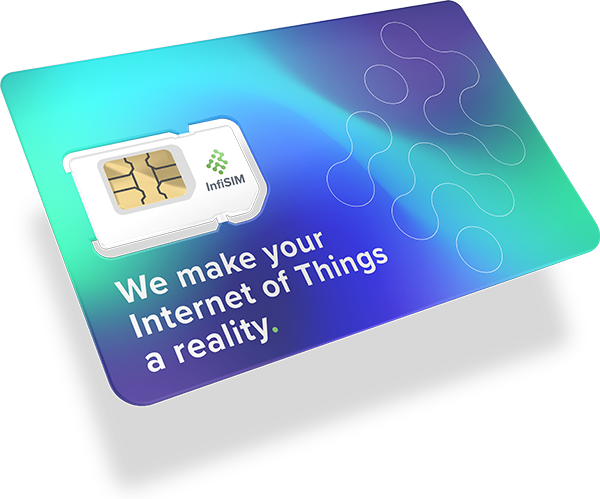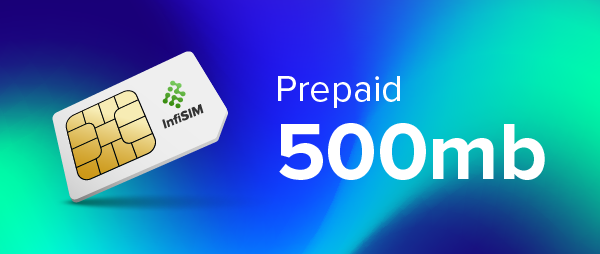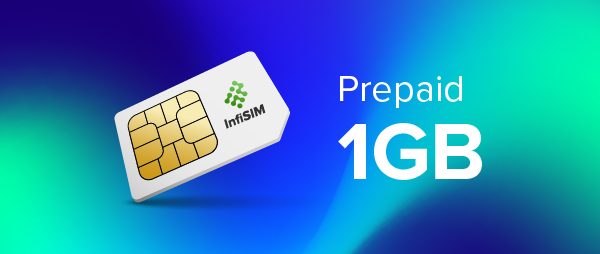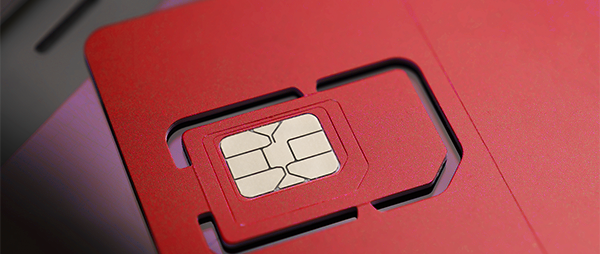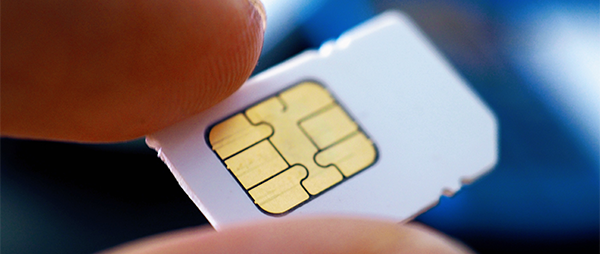Leading M2M connectivity made simple.
Empower your M2M project with our multi-network M2M SIM cards
Our Machine to Machine SIM Cards are utilised across the globe in a wide range of applications, from IoT in healthcare to smart energy solutions. Our cost-effective IoT connectivity solutions are designed to help you deploy and manage all of your connected devices reliably and seamlessly.
We are M2M SIM connectivity specialists
IoT adoption is at an all time high. Thanks to our extensive portfolio of M2M SIM cards and solutions, we’re leading the way when it comes to IoT connectivity and connected devices. So if you require secure two-way communication, over-the-air (OTA) SIM activation, LPWAN connectivity or multi-network capabilities, we have your business covered. And if you’re looking for more control, combine your InfiSIM solution with our advanced M2M SIM management platform, NOVA, for full visibility of your SIM estate.
Affordable M2M connectivity made easy.
Prepaid M2M SIM cards
Our prepaid M2M SIM cards are perfect for those who are looking to deploy low bandwidth M2M applications and don’t want to commit to a monthly tariff. Access 5 years of M2M connectivity in 28 countries across the UK, Europe, and USA.

UK, Europe & USA
Access 45 networks across 28 countries in UK, Europe, & USA

M2M connectivity
2G, 3G, 4G, 5G, NB-IoT & LTE-M connectivity available

M2M SIMs for any device
3-in-1 triple cut SIM cards: Mini (2FF), Micro (3FF), & Nano (4FF)

Manage your M2M SIMs
Access to our M2M Connectivity Management Platform, NOVA
Industry leading connectivity features.
Benefits of M2M SIM cards
 Multi-network
Multi-network

We provide non-steered multi-network SIMs. This means your IoT devices will always be open to connecting to the strongest network in your area.
 Robust
Robust

Industrial M2M SIMs can operate and deliver reliable performance under the harshest of environmental conditions, including extreme temperatures.
 Low-cost
Low-cost

Deploying M2M SIM cards can be a very cost-effective option for your business. Allow your operations to run more efficiently and make significant savings.
 Remote maintenance
Remote maintenance

Our IoT SIM cards can be maintained, diagnosed and updated remotely thanks to OTA technology. Reduce engineer callouts with InfiSIM.
We are the M2M experts.
Why choose InfiSIM for you M2M SIM cards?
We are recognised experts in machine-to-machine (M2M) communication and connectivity. We have extensive knowledge and experience in the implementation and deployment of M2M SIMs that connect devices and machines.
Our team of experts understand the intricacies of M2M deployment, including the protocols, standards, and technologies involved. We are able to leverage this knowledge to develop custom solutions that meet your unique requirements.
Whether it is connected IoT healthcare, industry 4.0, smart cities or anything else, we have the experience and expertise to help organisations improve their operations and drive growth through M2M communication. With a focus on customer satisfaction and innovation, InfiSIM is a leading M2M solutions provider and a trusted partner for businesses looking to leverage this powerful technology.
There are a wide range of industries taking advantage of IoT SIMs. Find our more about how businesses are utilising IoT connectivity to make their processes and operations more efficient.
Connectivity on a global scale.
We understand that worldwide M2M network coverage can be critical to your business operation. That’s why our multi-carrier roaming SIMs can connect to 400+ networks across the UK and 200+ other countries. From Mexico to Malta, Canada to Cambodia, InfiSIM have all your M2M needs covered.

Protect your business.
M2M SIM security
IoT Security is of the utmost importance when it comes to reducing the risk of your IoT devices being compromised. A private APN can be used to enable the secure M2M connection of provisioned IoT devices to your corporate network. By preventing your IoT infrastructure from being exposed to the entire public internet, you can rest assured that your vulnerability is kept to a minimum.
An IPSec VPN can also be applied to your M2M deployment in order to link two private networks over the public internet. The IPSec VPN does this securely by encrypting and authenticating all of the traffic being passed through the tunnel. Talk to our team to find out how InfiSIM can help maximise the security of your IoT solutions.
Know the difference.
Steered vs non-steered M2M SIMs
Unsteered or non-steered SIMs are multi-network SIM cards that are open to connecting to multiple networks whilst prioritising the one with the strongest signal. They are different to steered multi-network SIMs which are programmed to default to a parent network, even if a stronger network is available. At InfiSIM, all of our multi-network M2M solutions are unsteered.
Avoid bill shock.
Aggregated data pools
By aggregating your data across your SIM estate, you will have the flexibility to share data across all of your connected devices. If one of your devices is overusing data and another is under-using, they’ll both take data from the same pot. Rest knowing that the likelihood of you exceeding your data limit is far less likely with InfiSIM.

Roam the networks without restrictions.
Non-steered Global M2M connectivity
At InfiSIM, our multi-network roaming SIMs never default to a parent mobile network. We provide non-steered M2M connectivity, meaning our global M2M SIM cards are open to connecting to the strongest network available in your location.
By utilising Global M2M SIM cards that can seamlessly switch between networks (without prioritising one specific primary network), you will not only benefit from faster connectivity, but from increased up-time too. In fact, we pride ourselves on providing 99.98% up-time across all the major networks.
Any size for any IoT application.
Technical specifications | InfiSIM M2M SIM cards
InfiSIM’s M2M SIM cards are engineered with precision to meet the diverse needs of IoT deployments. Below, we detail the key technical specifications, ensuring you have all the information required to integrate our solutions seamlessly into your projects.
Form Factors
We offer a range of form factors to accommodate various device designs and installation requirements:
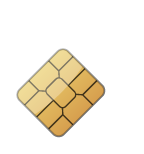
Mini SIM (2FF)
2FF is the most frequent size of M2M SIM that is used. It can frequently be found in large white goods, payment terminals and vehicles.

Micro SIM (3FF)
Micro SIMs are approximately 50% of the size of the 2FF SIMs. These are frequently found in mobile devices, smart watches and other wearable tech.

Nano SIM (4FF)
4FF is the smallest removable M2M SIM you can use. These are usually found in tiny devices that require small components.

Embedded SIM (MFF2)
Embedded SIM cards are non-removable components that are soldered to the circuit board of a device. These are often deployed in scenarios where manufacturers want to prevent end-users from accessing their SIM cards. eUICC SIMs are often delivered in this form factor, giving manufacturers and/or end-users the ability to provision SIMs remotely OTA (over the air).
Network compatibility:
InfiSIM ensures broad compatibility to future-proof your investments:
Multi-IMSI technology enables non-steered roaming across 550+ networks in 180+ countries, selecting the optimal signal automatically. Data rates support up to 1Gbps on 5G, with secure encryption via AES-256.
The 2G & 3G sunset is happening all over the world. Download our definitive guide to the 2G & 3G sunset to find out how your IoT services could be affected and what you can do to lessen the impact on your business.
“We are market leaders in the manufacturing of mechanised forestry equipment. These machines run complex control systems for real time decision making during the processing of each tree and to collect vast amounts of sensor data related to machine performance. Machines are deployed to the most remote areas of the UK usually for several months at a time.
This presented a problem for our telematics software connections used for remote support sessions and general data traffic to and from our servers. We trialled several solutions with other suppliers with very little success due to reliability and stability of the products offered.
I researched and found InfiSIM who couldn’t have been more helpful. Their knowledge about their product was very impressive and gave me the confidence to authorise a few trials. We were receiving data from our machines when we couldn’t even get a proper phone signal. Perfect!
We now have over 100 machines running our telematics software and we often receive compliments that we are now also the market leaders in the telematics within our industry. This wouldn’t have been possible without the InfiSIM product.
Our InfiSIM products are monitored through NOVA. This system is brilliant and saves huge amounts of time managing the SIMs.”
John Geddes | Komatsu Forest Ltd
Explore endless possibilities.
More M2M SIM card solutions by InfiSIM
Secure two-way communication.
Our M2M SIM cards can be provisioned with static IP addresses to enable secure two-way communication, which is essential for many IoT projects to work effectively. These fixed IP SIM cards allow for enhanced visibility and control of your devices whilst enabling end-to-end security and encryption. We also provide enhanced security features via IPsec VPN technology, if required.
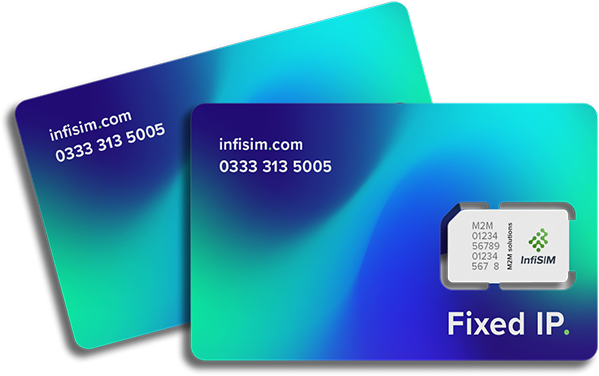
Simple to deploy.
How to get started with M2M SIM cards
Identify your requirements
Work out your overall needs for the project and identify the connectivity requirements of your IoT devices. You may need your SIMs to function and work consistently in extreme conditions, or you might find that an aggregated data solution is more cost-effective for your business etc.
Setup & trial your M2M SIM cards
Once you understand your requirements you may want to discuss a trial with your M2M SIM Card provider to test their compatibility with your devices. A trial will allow you to make sure that you’re happy with the performance and reliability of your new M2M SIMs before deploying them in bulk.
Deployment & roll out of your IoT solution
Once you’ve tested out a small trial deployment and you’re happy with your connectivity, you’ll want to roll out your M2M SIMs right away. If you have project deadlines that you need to meet, delays to this process can end up costing you money. At InfiSIM, our deployment is quick and effective.
Monitor your M2M connectivity
Use our industry-leading M2M SIM management platform, NOVA, to monitor your M2M deployments and make sure that they’re working as expected. NOVA provides you with all the information you require in order to make informed decisions regarding your data and connectivity.
Maintenance & alerts
It’s important that your IoT deployments continue to work in the long term. Alerts can be set up in NOVA to notify you when a specific device (or group of devices) has reached a certain data threshold. This information allows you to take action before a SIM overuses data and gets barred.
Your connectivity your way.
Are M2M SIM cards the only way to connect my devices?
M2M SIM cards aren’t the only way to connect your IoT devices. Other technologies such as LPWAN (low powered wide area network) allow you to connect your devices whilst maintaining low power consumption. However, in order to deploy LPWAN across your IoT applications, you’ll need specific or tailor-made hardware. If your hardware is LPWAN compatible, you could benefit from discussing your options with our team of connectivity specialists.
M2M SIM cards are the most widely used form of connectivity in the IoT market for a very good reason; they give you the flexibility to manage your own solution and deploy M2M connections cost-effectively.
Are you interested in our IoT connectivity solutions? Contact our team to start taking advantage of tomorrow’s technology, today.
Designed for a wide range of applications.
M2M SIM applications by industry
InfiSIM’s M2M SIM cards are versatile tools that drive efficiency and innovation across various sectors. By providing reliable, global connectivity, they enable real-time data transmission and remote management, transforming how businesses operate. Below, we explore key industry applications, complete with real-world examples and case studies to illustrate their impact.
A quick overview of M2M technology
M2M stands for Machine to Machine communication and it is the direct connection between two or more devices. There are endless applications of M2M technology, including payment terminals, pet tracking, smart street lighting, and many, many more.
Modern Machine to Machine communication has evolved into a system of networks in which data is traversed between devices. Information is sent from one device (or machine) via a central hub, before it reaches another device such as a mobile or computer. By traversing data between devices in this way, we are able to automate tasks and manage our operations remotely, increasing productivity.
Over the past 2 decades, mobile networks have expanded around the globe and the speed of M2M connectivity has greatly increased. This has worked hand-in-hand with the rapid growth of IoT technologies that provide remote, fast solutions to end-user issues.
What are M2M SIM cards?
M2M SIM cards, or Machine-to-Machine SIM cards, represent a pivotal advancement in connectivity solutions tailored specifically for the Internet of Things (IoT) landscape. These specialised SIM cards facilitate seamless communication between devices, enabling automated data exchange without human intervention. At InfiSIM, we design our M2M SIM cards to meet the rigorous demands of industrial and commercial applications, ensuring reliable performance in diverse environments.
Unlike traditional SIM cards, which are primarily used in consumer mobile phones for voice calls, messaging, and personal data usage, M2M SIM cards are optimised for data-centric operations. They prioritise low-power consumption, extended lifespan, and robust connectivity, making them ideal for devices that operate remotely or in harsh conditions. For instance, while a standard SIM might suffice for everyday smartphone use, it lacks the critical functionalities and management features that are essential for IoT deployments.
Key differences include durability: Industrial M2M SIMs are built to withstand extreme temperatures ranging from -40°C to 105°C, vibrations, and humidity, whereas regular SIMs are not engineered for such resilience. Management capabilities also set them apart; M2M SIMs support remote over-the-air (OTA) updates and centralised control via platforms such as our NOVA system, allowing for efficient fleet management of thousands of devices. In contrast, traditional SIMs require manual handling and offer limited remote oversight.
From a technical standpoint, InfiSIM’s M2M SIM cards support a broad spectrum of network technologies, including 2G, 3G, 4G LTE, 5G, NB-IoT, and LTE-M. This ensures compatibility with both legacy systems and future-proof innovations. Form factors vary to suit different needs: 2FF (standard), 3FF (micro), 4FF (nano), MFF2 (embedded solderable for permanent installation), and eSIM (electronically programmable for flexibility). Security features are paramount, with built-in encryption, private APNs, and compliance with standards such as GDPR.
Our M2M SIM cards also feature multi-IMSI technology for non-steered global roaming, connecting to the strongest available network in over 200 countries without carrier bias. This results in superior uptime & coverage, and reduced latency. Pricing models are flexible, with aggregated data pools starting at £0.50 per month, contrasting with the fixed, often higher costs of consumer SIM plans.
In essence, InfiSIM’s M2M SIM cards empower businesses to harness the full potential of IoT, from smart metering to asset tracking. By choosing our solutions, you gain not just connectivity, but a scalable, secure foundation for innovation. Request your free starter kit today to experience the difference.
How does M2M technology work?
All M2M solutions require an end-device that collects data (usually via a sensor or tracker), some form of connectivity to traverse the data, and another machine that receives this data. Once your second machine has received the data, it is either interpreted by software, people or the device itself, or it is relayed onto another machine.
A good example of M2M in the real-world would be a smart fridge. Smart fridges use sensors to analyse the contents of your fridge and ensure that you never forget to restock. When you are running low on a specific item, the fridge will add it to a virtual shopping list which will be automatically sent to your smartphone. In this situation, the data being traversed is related to the items on your virtual shopping list. Similarly, your smart fridge can analyse increases in temperature. If it detects a sudden rise, it will send the temperature data to your smartphone in the form of an alert. This way you can react and ensure that your fridge is closed properly.
Most M2M systems are usually made up of some or all of the following:
Machine-to-Machine connectivity
All M2M solutions require some form of connectivity to operate. Although some wired connections are considered to be M2M connections, most are wireless.
M2M SIM cards allow your machines to connect via the mobile networks. This enables you to deploy your devices anywhere in the world where there is cellular connectivity. For this reason, connecting your machines via the mobile networks is the most popular method of deploying an M2M solution. Solutions such as fleet tracking, digital motorway signage and remote CCTV etc. simply wouldn’t work without a mobile network connection.
